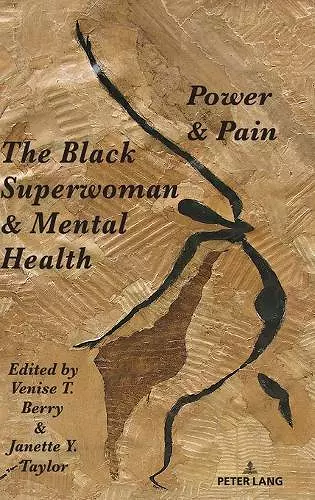The Black Superwoman & Mental Health
Power & Pain
Shirley R Steinberg editor Awad Ibrahim editor Venise T Berry editor Janette Y Taylor editor
Format:Hardback
Publisher:Peter Lang AG, Internationaler Verlag der Wissenschaften
Published:30th Jun '25
Currently unavailable, and unfortunately no date known when it will be back
This hardback is available in another edition too:
- Paperback£28.80was £32.00(9783034352062)

Relatively recently it has been acknowledged that Black women too often experience extreme psychological distress such as depression, anxiety disorders, panic, phobias, fear, eating disorders, low self-esteem, loneliness from social isolation, PTSD/PTSS, emotional pain, suffering, and suicide to name a few. Mental health conditions both negatively or positively affect their physical health and wellbeing. For example, depression is found to be associated with an increased risk of hypertension and other chronic illnesses such as diabetes, asthma, cancer, cardiovascular disease, and arthritis (Badescu et al. 2016; DeMoss et al. 2020; van Tuijl et al. 2023; Webb, 2022).
We, Black Superwomen, have a long history of denying our mental health challenges. The status of Black women’s mental health has always shown up in our physical reality and, currently, we are in another moment of awareness that seeks to clarify the health consequences and costs of the Black superwoman trope. Originally published in 1978, Michele Wallace brought to our attention the myth of the Black Superwoman highlighting our struggles and humanity. More recently Marita Golden in 2021 explored the same issue interviewing Black women about the hidden mental health crisis surrounding their lives. Her book offers crucial stories about how important it is for Black women to ask for help, learn strategies for healing, and build self-care into their lives.
Unfortunately, when we do strive to heal ourselves, we encounter difficulties concerning access to care. So, we must creatively and collectively develop innovative avenues of care for ourselves. We, Black (Super)women, must prioritize our health and wellbeing not alone but also in concert with other Black women who are on similar journeys. Conferences such as the Annual Strong Black Women Redefined Conference (Renaye) offering self-love healing retreats organized for and by Black women, and podcasts like Therapy for Black Girls (Harden-Bradford) are designed to help. Today, there are a range of actions, methods, and expressive therapies to help soothe the soul, but many of us don’t take advantage. Reading The Black Superwoman and Mental Health: Power and Pain is one step not only for ourselves as individuals, but for our communities as well. We must continue the early education of Black girls and other women towards healthier mental and physical wellbeing.
It is not easy to...
Behind the imagery of “keeping on keeping on” Black women, regardless of their strength, experience needs for help, whether health care, emotional, or spiritual support. The contents of this volume enlighten and inspire through a critical examination of what it is like to be a Black Superwoman. Dr. Nancy Fugate Woods
The book you are holding is a whisper, a cry, a scream. The Black Superwoman and Mental Health: Power and Pain is a brilliantly imagined, conceived, and produced manifesto. Marita Golden
A significant and amazing collection of essays, stories, and poems illuminating the stereotypes, stigmas, and racism affecting black women. Exploring mental health needs, the book triumphantly empowers individual and collective voices. Reading this book is an emotional journey demonstrating how through ancestry, spirituality, and sensuality black women’s bodies can be reclaimed, their self-worth upheld. Hearing our sister’s voices reminds us that black women are capable of balancing both strength and vulnerability and healing to build a life of more energy, love, and joy. Jewell Parker Rhodes, NYT Bestselling Author of Ghost Boys and Black Brother, Black Brother
ISBN: 9783034351775
Dimensions: unknown
Weight: 486g
266 pages
New edition